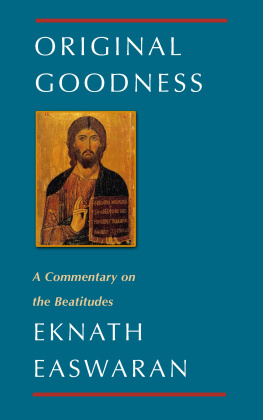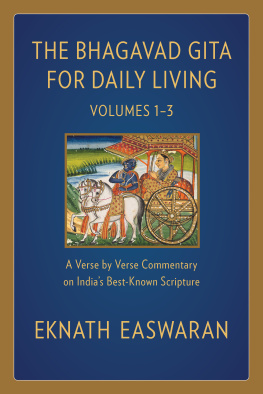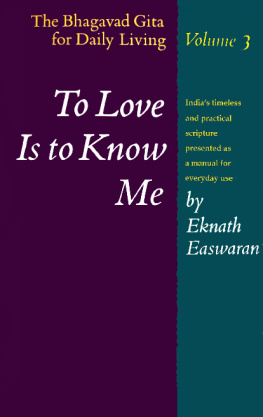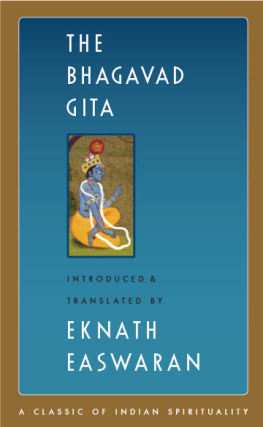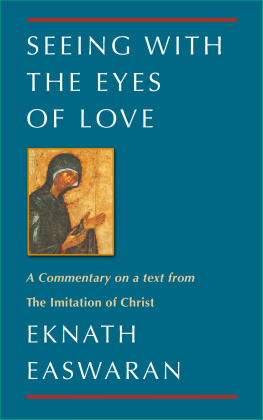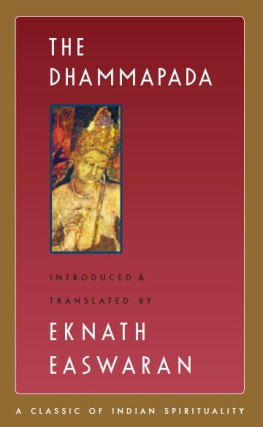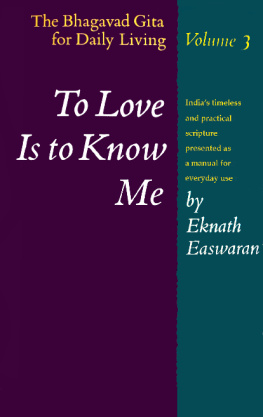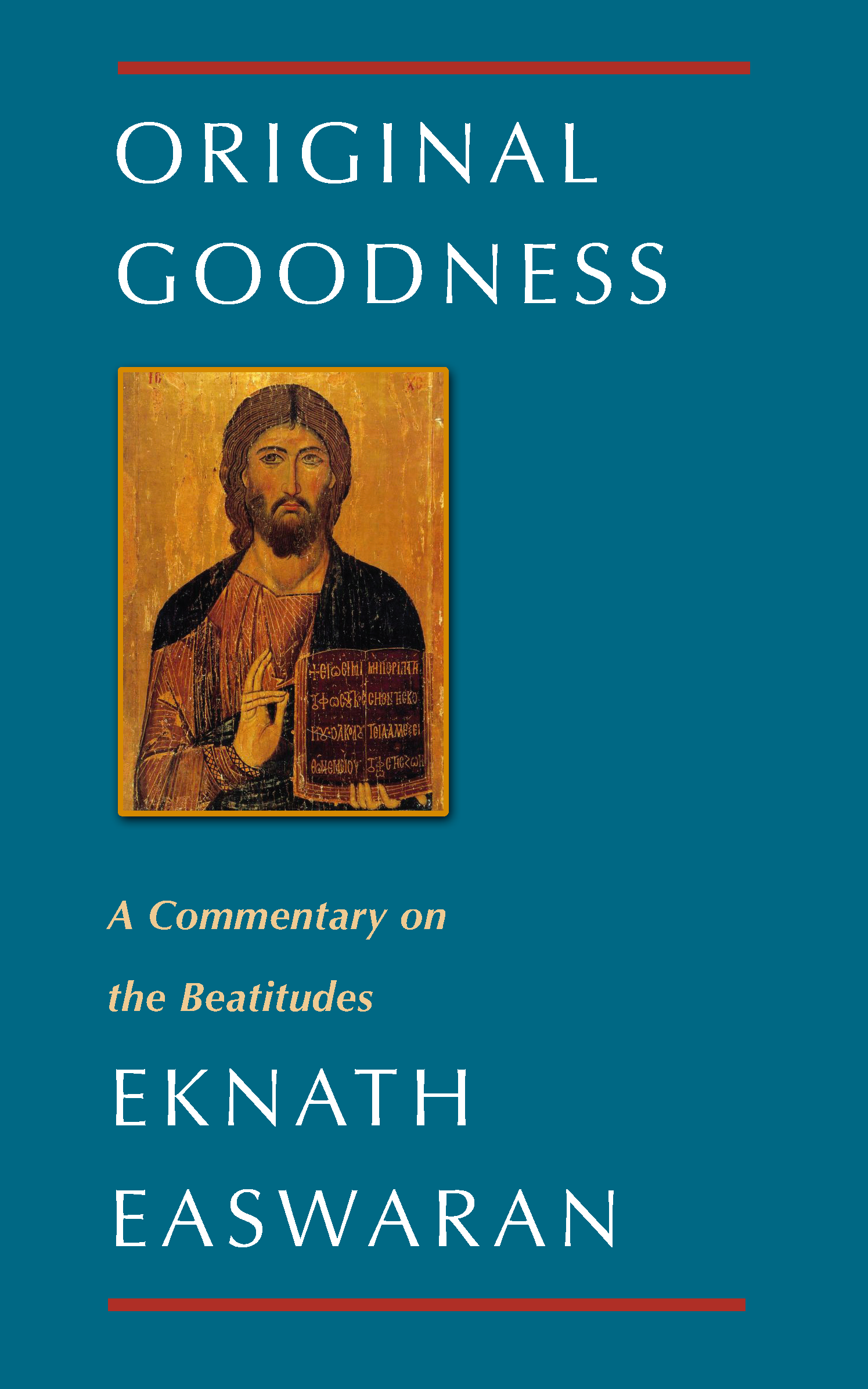Original Goodness
EKNATH EASWARAN
A COMMENTARY ON THE BEATITUDES
OF THE SERMON ON THE MOUNT
NILGIRI PRESS
20170602
Table of Contents
Chapter 1 Original Goodness
I have spoken at times of a light in the soul, a light that is uncreated and uncreatable... to the extent that we can deny ourselves and turn away from created things, we shall find our unity and blessing in that little spark in the soul, which neither space nor time touches.
Meister Eckhart
These words, addressed to ordinary people in a quiet German-speaking town almost seven hundred years ago, testify to a discovery about the nature of the human spirit as revolutionary as Einsteins theories about the nature of the universe. If truly understood, that discovery would transform the world we live in at least as radically as Einsteins theories changed the world of science. We have grasped the mystery of the atom, General Omar Bradley once said, and rejected the Sermon on the Mount.... Ours is a world of nuclear giants and ethical infants. If we could grasp the mystery of Eckharts uncreated light in the soul surely no more abstruse than nuclear physics! the transformation in our thinking would set our world right side up.
Meister or Master Eckhart the title attests to his scholarship, but seems even better suited to his spiritual authority lived almost exactly at the same time and for the same span as Dante, and both seem born to those lofty regions of the spirit that do not belong to any particular culture, religion, or age but are universal. Yet, also like Dante, Eckhart expressed perfectly something essential about his times. The end of the thirteenth century was a period of intense turmoil in Europe, and the Rhine valley, where Eckhart was born, was the breeding ground of various popular religious societies which alarmed conventional Christians. Yet a God who could be known personally and a path by which to reach him were what an increasing number of people yearned for, and Eckharts passionate sermons, straining to convey the Absolute in the words of the street and marketplace, became immensely popular.
And what did he teach? Essentially, four principles that Leibniz would later call the Perennial Philosophy, because they have been taught from age to age in culture after culture:
* First, there is a light in the soul that is uncreated and uncreatable: unconditioned, universal, deathless; in religious language, a divine core of personality which cannot be separated from God. Eckhart is precise: this is not what the English language calls the soul, but some essence in the soul that lies at the very center of consciousness. As Saint Catherine of Genoa put it, My me is God: nor do I know my selfhood except in God. In Indian mysticism this divine core is called simply atman, the Self.
* Second, this divine essence can be realized . It is not an abstraction, and it need not Eckhart would say must not remain hidden under the covering of our everyday personality. It can and should be discovered, so that its presence becomes a reality in daily life.
* Third, this discovery is lifes real and highest goal. Our supreme purpose in life is not to make a fortune, nor to pursue pleasure, nor to write our name on history, but to discover this spark of the divine that is in our hearts.
* Last, when we realize this goal, we discover simultaneously that the divinity within ourselves is one and the same in all all individuals, all creatures, all of life.
Words can certainly be ambiguous with ideas such as these, and mysticism is no exception. In this book, a mystic is one who not only espouses these principles of the Perennial Philosophy but lives them, whose every action reflects the wisdom and selfless love that are the hallmark of one who has made this supreme discovery. Such a person has made the divine a reality in every moment of life, and that reality shines through whatever he or she may do or say and that is the real test. It is not occult fancies or visions or esoteric discourses that mark the mystic, but an unbroken awareness of the presence of God in all creatures. The signs are clear: unfailing compassion, fearlessness, equanimity, and the unshakable knowledge, based on direct, personal experience, that all the treasures and pleasures of this world together are worth nothing if one has not found the uncreated light at the center of the soul.
These are demanding criteria, and few people in the history of the world can be said to have met them. I shall often refer to these men and women collectively as the great mystics, not to obscure their differences, but to emphasize this tremendous undercurrent of the spirit that keeps resurfacing from age to age to remind us of our real legacy as human beings.
On this legacy the mystics are unanimous. We are made, the scriptures of all religions assure us, in the image of God. Nothing can change that original goodness. Whatever mistakes we have made in the past, whatever problems we may have in the present, in every one of us this uncreated spark in the soul remains untouched, ever pure, ever perfect. Even if we try with all our might to douse or hide it, it is always ready to set our personality ablaze with light.
When I was growing up in South India, just half an hours walk from my home was a lotus pond so thickly overlaid with glossy leaves and gleaming rose and white blossoms that you could scarcely see the water. One of the Sanskrit names for this most exquisite of flowers is pankaja, born from the mud. In the murky depths of the pond a seed takes root. Then a long, wavering strand reaches upward, groping through the water toward the glimmer of light above. From the water a bud emerges. Warmed by the suns rays, it slowly opens out and forms a perfect chalice to catch and hold the dazzling light of the sun.
The lotus makes a beautiful symbol for the core of goodness in every human being. Though we are born of human clay, it reminds us, each of us has the latent capacity to reach and grow toward heaven until we shine with the reflected glory of our Maker.
Early in the third century, a Greek Father of the Church, Origen, referred to this core of goodness as both a spark and a divine seed a seed that is sown deep in consciousness by the very fact of our being human, made in the image of our Creator. Even though it is covered up, Origen explains,
because it is God that has sowed this seed in us, pressed it in, begotten it, it cannot be extirpated or die out; it glows and sparkles, burning and giving light, and always it moves upward toward God.
Eckhart seized the metaphor and dared take it to the full limits it implies:
The seed of God is in us. Given an intelligent and hard-working farmer, it will thrive and grow up to God, whose seed it is, and accordingly its fruits will be God-nature. Pear seeds grow into pear trees, nut seeds into nut trees, and God-seed into God.
Its fruit will be God-nature! What promise could be more revolutionary? Yet Eckhart, like other great mystics of the Church before and after him, does no more than assure us of his personal experience. The seed is there, and the ground is fertile. Nothing is required but diligent gardening to bring into existence the God-tree: a life that proclaims the original goodness in all creation.
The implications of this statement are far-reaching. Rightly understood, they can lift the most oppressive burden of guilt, restore any loss of self-esteem. For if goodness is our real core, goodness that can be hidden but never taken away, then goodness is not something we have to get. We do not have to figure out how to make ourselves good; all we need do is remove what covers the goodness that is already there.

